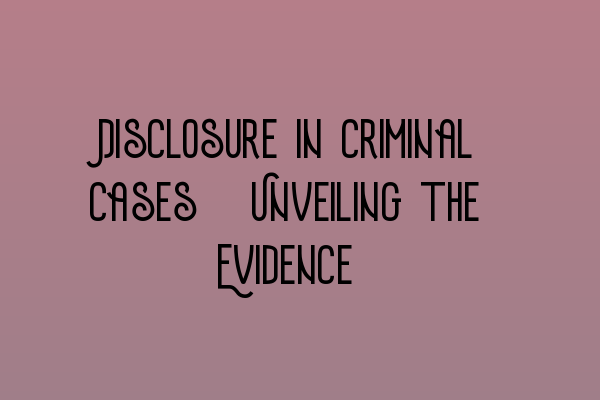Disclosure in Criminal Cases: Unveiling the Evidence
In the world of criminal law, disclosure plays a crucial role in ensuring a fair trial and balancing the scales of justice. In simple terms, disclosure refers to the process of unveiling the evidence that the prosecution and defense intend to rely upon during a criminal case. It is a legal obligation for both sides to disclose the evidence they possess to the other party.
Effective disclosure allows the defendant to understand the case against them, enables them to prepare a robust defense strategy, and protects their right to a fair trial. On the other hand, it ensures that the prosecution presents a complete and accurate picture of the evidence they have gathered.
The Importance of Disclosure
Disclosure serves as a cornerstone of the criminal justice system and is guided by the principles of fairness and transparency. By disclosing evidence to the defense, the prosecution upholds its duty to act in the interests of justice. This process also helps in avoiding wrongful convictions and protecting the rights of the accused.
Failure to provide full and timely disclosure can lead to miscarriages of justice and hinder the integrity of the legal system. It is a non-negotiable obligation for both the prosecution and defense, and any deviations from the prescribed procedures can have serious consequences.
Types of Disclosure
Disclosure can be classified into two broad categories:
- Initial Disclosure: At the beginning of a case, both the prosecution and defense must disclose the essential details of their case to each other. This includes witness statements, expert reports, and any other evidence they plan to rely upon.
- Ongoing Disclosure: Throughout the course of the trial, both parties have a responsibility to disclose any additional evidence that comes to light. This allows the defense to adapt their strategy and challenges the prosecution to present a thorough and fair case.
Ongoing disclosure is a critical component of criminal cases, particularly as new evidence may emerge during witness testimonies or expert examinations. Failure to provide ongoing disclosure can lead to the exclusion of evidence or even the collapse of the case.
Challenges in Disclosure
Despite the importance of disclosure, various challenges can arise during the process. These challenges include:
- Lack of clarity in the evidential material
- Determination of relevant and non-disclosable material
- Protecting sensitive information such as witness identities
- Identifying and avoiding potential conflicts of interest
To address these challenges, it is essential to have a thorough understanding of the legal requirements surrounding disclosure and engage in effective communication between the prosecution and defense.
Conclusion
Disclosure in criminal cases is a vital aspect of the legal process, ensuring a fair trial and safeguarding the rights of the accused. It demands transparency, accountability, and adherence to procedural rules.
To learn more about criminal practice and enhance your expertise, consider attending our Workshops and Seminars on Criminal Practice. Stay updated with the latest changes in UK criminal laws by reading our article on Updates in UK Criminal Laws: Staying Informed and Prepared.
Are you part of an SQE criminal law study group? Read our guide on Enhancing Your SQE Criminal Law Study Group Experience for tips and strategies to maximize your learning and collaboration.
If you want to delve deeper into the intricacies of criminal evidence rules, we recommend reading our detailed analysis on Decoding Criminal Evidence Rules: A Detailed Analysis. Lastly, ensure the protection and support of victims in criminal procedures by understanding their rights through our article on Ensuring Rights of Victims in Criminal Procedures: Legal Protections and Support.
